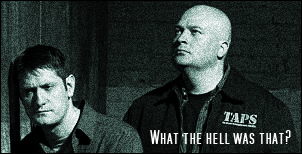Riddle Minute
Moderator:Æron
- Dr. Sticks
- Posts:2319
- Joined:Mon Nov 17, 2008 12:48 pm
- Location:Alabama
- Contact:
yeah, I'm not entirely sure how
http://www.spingain.com/?ref=146518
Well put doog. You never posted anything offensive whatsoever
we know she'll be back, like a good bitch should.
I'm not really surprised, it's pretty complicated. It involves modular arithmetic.yeah, I'm not entirely sure how
To start you off:
x² - 38² = (x + 38)(x - 38)
Because 38² = 1444 and x² also ends in 444, x² - 38² must divide by 1000. Therefore:
(x + 38)(x - 38) = 0 (mod 1000)
EDIT: There's a simpler method which will give you the same answer, and it starts as follows:
x² = 444 (mod 1000)
Split it into relatively prime moduli:
x² = 4 (mod 8) and x² = 69 (mod 125)
Last edited by nickspoon on Sun May 17, 2009 7:28 pm, edited 1 time in total.
If you do not repent, I will come to you and remove your lampstand from its place. (Revelation 2:5, NIV)
Josh Woodward, Ohio Singer/Songwriter, offers his songs for free. Give him a listen.
Josh Woodward, Ohio Singer/Songwriter, offers his songs for free. Give him a listen.
- Dr. Sticks
- Posts:2319
- Joined:Mon Nov 17, 2008 12:48 pm
- Location:Alabama
- Contact:
ah, I've never been taught how to do modular arithmetic, so that explains my ineptitude at figuring it out
http://www.spingain.com/?ref=146518
Well put doog. You never posted anything offensive whatsoever
we know she'll be back, like a good bitch should.
Okay, method is as follows (assume = is congruence with mod).
x² = 444 (mod 1000)
Split it into relatively prime moduli:
x² = 4 (mod 8) and x² = 69 (mod 125)
x² = 4 (mod 8)
x = ±2 (mod 8)
x = 2 (mod 4)
x² = 69 (mod 125)
Therefore x² = 4 (mod 5) and x² = 19 (mod 25)
x² = 4 (mod 5)
x = ±2 (mod 5)
This equation states that x = 5t ± 2, t ∈ ℤ.
Therefore, (5t ± 2)² = 19 (mod 25)
25t² ± 20t + 4 = 19 (mod 25)
±20t = 15 (mod 25)
4t = ±3 (mod 5)
t = ±2 (mod 5)
x = ±12 (mod 25)
Repeating this gets you x = ±38 (mod 125). Then, using the Chinese Remainder Theorem:
x = 125t ± 38
125t ± 38 = 2 (mod 4)
t = 0 (mod 4)
This equation states that t = 4s, s ∈ ℤ
x = 500s ± 38
x² = 250000s² ± 38000s + 1444 = 444 (mod 1000)
x = ±38 (mod 500)
Therefore, the next smallest number with the property is 500-38 = 462.
x² = 444 (mod 1000)
Split it into relatively prime moduli:
x² = 4 (mod 8) and x² = 69 (mod 125)
x² = 4 (mod 8)
x = ±2 (mod 8)
x = 2 (mod 4)
x² = 69 (mod 125)
Therefore x² = 4 (mod 5) and x² = 19 (mod 25)
x² = 4 (mod 5)
x = ±2 (mod 5)
This equation states that x = 5t ± 2, t ∈ ℤ.
Therefore, (5t ± 2)² = 19 (mod 25)
25t² ± 20t + 4 = 19 (mod 25)
±20t = 15 (mod 25)
4t = ±3 (mod 5)
t = ±2 (mod 5)
x = ±12 (mod 25)
Repeating this gets you x = ±38 (mod 125). Then, using the Chinese Remainder Theorem:
x = 125t ± 38
125t ± 38 = 2 (mod 4)
t = 0 (mod 4)
This equation states that t = 4s, s ∈ ℤ
x = 500s ± 38
x² = 250000s² ± 38000s + 1444 = 444 (mod 1000)
x = ±38 (mod 500)
Therefore, the next smallest number with the property is 500-38 = 462.
If you do not repent, I will come to you and remove your lampstand from its place. (Revelation 2:5, NIV)
Josh Woodward, Ohio Singer/Songwriter, offers his songs for free. Give him a listen.
Josh Woodward, Ohio Singer/Songwriter, offers his songs for free. Give him a listen.
It wasn't all that much of a riddle, either.
New one now, and I promise it's less mathematical.
John and Adam play a game. On a blackboard there are written the numbers 1 through 1729 (inclusive). The instructions given are as follows:
"Each of you will take turns erasing two numbers and replacing them with the positive difference of the two erased numbers. You will continue until only one number remains on the board. John will win if the number remaining is odd, and Adam will win if the number remaining is even."
Who wins, and why?
New one now, and I promise it's less mathematical.
John and Adam play a game. On a blackboard there are written the numbers 1 through 1729 (inclusive). The instructions given are as follows:
"Each of you will take turns erasing two numbers and replacing them with the positive difference of the two erased numbers. You will continue until only one number remains on the board. John will win if the number remaining is odd, and Adam will win if the number remaining is even."
Who wins, and why?
If you do not repent, I will come to you and remove your lampstand from its place. (Revelation 2:5, NIV)
Josh Woodward, Ohio Singer/Songwriter, offers his songs for free. Give him a listen.
Josh Woodward, Ohio Singer/Songwriter, offers his songs for free. Give him a listen.
This is just a guess but I guess it's a start.
I say John wins and here's my justification.
If you subtract a even by even then you get an even. If you subtract an odd by an odd you get an even. If you subtract an odd by an even or vice versa you get an odd. This makes the product ratio of evens to odds 2:1. Now let's check out some situations. If one of those evens are subtracted by that odd then you get an odd makeing the ratio of evens to odds 1:1. Which turns out if subtracted them by each other you get an odd still. Now if those two evens subtracted each other then you get a even but if that even is subtracted by that odd or vice versa, it's still odd.
[Edit:] I just realized something too. Since it's 1-1729 that means that there is 1 more odd than evens. So theorically, if you subtract all odds by odds first, you would still have one odd which you can't get rid of since you don't have another odd to get rid of it.
Ex
#'s: 2, 4, 7
Situation 1:
7+2= 5
5-4=1
Situation 2:
4-2= 2
7-2=5
See? In both situations they are all odd.
I say John wins and here's my justification.
If you subtract a even by even then you get an even. If you subtract an odd by an odd you get an even. If you subtract an odd by an even or vice versa you get an odd. This makes the product ratio of evens to odds 2:1. Now let's check out some situations. If one of those evens are subtracted by that odd then you get an odd makeing the ratio of evens to odds 1:1. Which turns out if subtracted them by each other you get an odd still. Now if those two evens subtracted each other then you get a even but if that even is subtracted by that odd or vice versa, it's still odd.
[Edit:] I just realized something too. Since it's 1-1729 that means that there is 1 more odd than evens. So theorically, if you subtract all odds by odds first, you would still have one odd which you can't get rid of since you don't have another odd to get rid of it.
Ex
#'s: 2, 4, 7
Situation 1:
7+2= 5
5-4=1
Situation 2:
4-2= 2
7-2=5
See? In both situations they are all odd.
Correct. In other words, whenever you decrease the number of odd numbers on the board, you decrease it by two (odd/odd removes two odds, odd/even and even/even remove no odds). Because you start with an odd number of odd numbers, there must come a point when there is only one odd number.
If you do not repent, I will come to you and remove your lampstand from its place. (Revelation 2:5, NIV)
Josh Woodward, Ohio Singer/Songwriter, offers his songs for free. Give him a listen.
Josh Woodward, Ohio Singer/Songwriter, offers his songs for free. Give him a listen.
- bad ass antelope
- Posts:233
- Joined:Sun Jun 28, 2009 9:24 pm
Who is online
Users browsing this forum: No registered users and 60 guests

